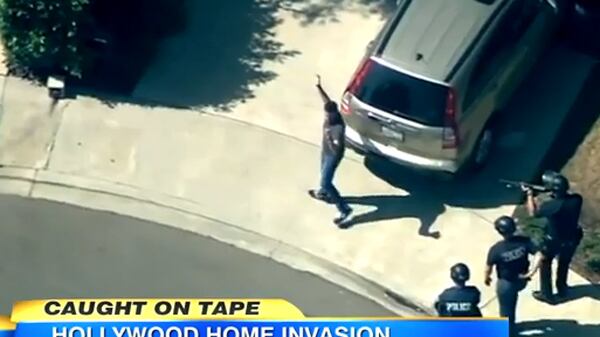Neither Ashton Kutcher nor Miley Cyrus was home when they became “swatting” victims. But a Los Angeles prosecutor, who was home—blogging in the middle of a July night last year when a SWAT team banged on his door, yelling “Fire!” and pointing guns at him through a window—described his experience with the hoax as the most terrifying night of his life.
Deputy District Attorney Patrick Frey, who blogs about his conservative political views, believes he was targeted last summer because of posts he wrote about a convicted bomber. A week after Frey received an email threat, a man who spoofed his telephone called 911 pretending to be him and claiming to have just killed his wife. The Los Angeles County Sheriff’s Office dispatched a SWAT team to Frey’s Lomita home just south of Los Angeles—which is exactly what the caller had intended. By the end of the incident, Frey was in handcuffs in a patrol car and his wife was dragged out of bed by deputies while their children slept.
The same thing had happened eight days earlier to New Jersey blogger, Mike Stack. Someone posing as Stack called three different police departments to say he had just shot his wife. Two of the addresses were old, but one was current, and Stack, like Frey, was led out of his house at gunpoint. (Editor's Note: A previous version of this article incorrectly identified Stack as one of the first people to retweet photographs of former Rep. Anthony Weiner in his underwear. Stack never posted photos of Weiner online.)
“It’s a very dangerous situation, and I think it’s a miracle that nobody’s been killed yet,” Frey told The Daily Beast in an interview Thursday. “I had police officers pointing guns at me; my cellphone was in my hand. If they had thought I was armed and dangerous, I was one finger-pull of the trigger of losing my life that night. It was very scary. It seemed like it was designed to cause us the potential for being shot and killed.”
The crime of swatting is still unfamiliar to many people, but it has existed for about a decade, according to Kevin Kolbye, the assistant special agent in charge of the FBI’s Dallas office, which headed the first federal swatting case in 2007. Similar to a bomb hoax, swatting consists of a false report for emergency services in which someone spoofs his or her telephone number using voice-over IP (VOIP) and other less traditional telecommunication methods to hide the caller’s identity and make the call appear to come from the victim’s residence. The goal is to mobilize SWAT teams or other emergency responders to go to fake murder scenes or hostage situations.
In 2002 the FBI first identified this type of hoax, but it took a few years for the agency to determine how to prosecute these crimes, Kolbye said. Swatters are typically men younger than 30 who are reclusive and spend most of their time on the Internet. While no has been killed in these episodes, a few people have received minor scrapes while running from the police, one police officer was injured while responding, and two individuals suffered minor heart attacks from shock.
The most infamous case to date involved a group of 10 online friends in Massachusetts who were convicted in 2009 in more than 300 instances of swatting. In some of the cases, they met their victims on social networks or online dating sites and retaliated against them if, for example, they refused to engage in sexual conversations, Kolbye said. The group often recorded the swatting incidents and “brag posted” them on social networks. Sometimes, they even swatted each other, Kolbye said.
“When I was a kid, a hoax was calling for a pizza that no one ordered,” Kolbye said. “Today this younger generation seems to be using the Internet and the phone lines to up the game a little bit. So calling for pizza is no longer a hoax. Calling a SWAT team is now a hoax.”
In the Dallas–Fort Worth area, Kolybe said, there are 12 to 15 incidents of swatting a year. Nationwide, Kolbye estimates, there are 400 annually. In New Jersey, for example, the Bergen County Police Department’s SWAT team on July 23 burst into a home where someone allegedly had killed four people and taken others hostage. All police found inside was a cat. On Aug. 2, the Hialeah Police Department in South Florida received a teletype that a shooter with an AR-15 rifle was holding someone hostage. After evacuating surrounding buildings for five hours, the SWAT team entered the house and discovered it was empty. Eight days later, San Francisco police, responding to a call from a man that his brother was being held hostage, descended on the home of a young couple and their young children.
“The majority of instances are younger generations playing Call of Duty or Modern Warfare,” Kolbye said. “The loser gets upset. It’s online gaming, you’ve never met the person you’re competing against, and you call the police department on the kid. But now we’ve seen high-profile actors or entertainers that have been swatted. And we’ve seen public figures that use their First Amendment rights to talk about their views, and they become victims too. So I wouldn’t say it’s anyone in particular. It’s a hoax that is retaliatory in nature.”

On May 27, CNN contributor and RedState managing editor Erick Erikson became the third conservative blogger to be targeted, prompting Sen. Saxby Chambliss (R-Ga.) and Rep. Kenny Marchant (R-Texas) to ask the Department of Justice to determine if federal laws had been violated. Police showed up at Erikson’s home in Macon, Ga., after someone called 911 claiming to be Erikson and saying he had just killed his wife. A few days later, more than 85 members of Congress signed another letter authored by Rep. Sandy Adams (R-Fla.) also asking U.S. Attorney General Eric Holder to review the cases.
“The use of SWAT-ting as a harassment tool is apparently not new, but its use as a tool for targeting political speech appears to be a more recent development,” Chambliss wrote in his letter. “During the last year, some of the more widely reported cases of SWAT-ting have taken place against blog operators across the country, including in Georgia. The emerging pattern is both disturbing and dangerous.”
Three weeks later, another conservative blogger was targeted. On June 25, Aaron Walker and his wife were in their Virginia home when six police cars and two officers carrying M-4 rifles knocked insistently on his door. Police had been told Walker had killed his wife.
“From the Miley and Ashton incidents, I get the sense that it was almost like somebody was harassing them or sending a message,” Frey said. “With it taking place during the day, it’s tough to know the intention. I have no reason to believe that the person or persons behind the celebrity swattings have any connection to the things that have happened to those of us who are political writers and commentators.”
The Los Angeles Police Department has not determined if there is a connection between the incidents involving Cyrus and Kutcher, who are both on the CBS comedy Two and a Half Men. Police were called to Cyrus’s home in Studio City in August to investigate an alleged home invasion, kidnapping, and shooting. Police quickly figured out that she was out of town and that the call was a hoax.
The incident Wednesday at Kutcher’s home was more complicated and involved the SWAT team. Kutcher was on set in Burbank when police were notified that shots were fired inside the house, and that no one could get out. Three workers at Kutcher’s Hollywood Hills residence were briefly detained as police sorted it out.
“This kind of situation depletes resources and puts people in great danger—our officers and the people involved,” LAPD Lt. Andy Neiman said. “They don’t expect that kind of police response, and they may or may not cooperate. They’re in their home and they belong there, so it’s quite shocking. But the officers are responding to what they believe to be accurate information, so it’s dangerous for both sides.”
Police were not called to Kutcher’s home by telephone; the suspect used a teletype message, the type of communication a deaf person would use, Neiman said.
“That’s a new trend that we’re seeing,” Kolbye said. “But people should know that any time you use either the AT&T service for the hearing impaired or a computer or a phone line, you’re leaving some type of evidence for us.”
When a swatter is convicted on federal charges, the typical sentence is five to 10 years, Kolbye said. On the state level, charges range from terroristic threats to filing a false police report. The federal government can prosecute swatters for fraud in connection with computers or other devices and also can charge them with conspiracy when more than one person is involved.
Because the political bloggers who have been targeted live in different states, Frey has met with the FBI about the incidents. No arrests have been made in connection with any of those events.
“I had never heard of this before last June,” Frey said. “But now that I’m paying attention to it, I see evidence of it happening fairly consistently. Half the time you don’t have a report of why it might have happened, and the other half, there’s a mom somewhere saying that her son got into a fight with someone on Xbox Live. All I know is that it’s a very dangerous situation.”






